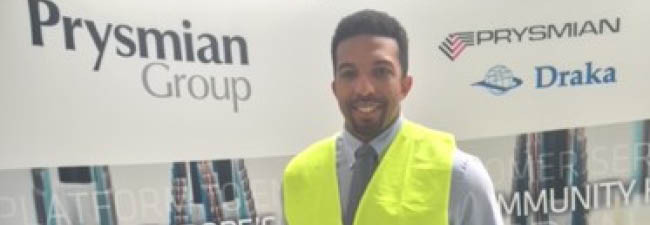Many students who join the international business program aspire to work for a multinational corporation upon graduation; they have a desire to work with people from various cultures, share different ways of approaching and solving problems and live in new, exciting locations. This aspiration fuels many of the international business applications at the Darla Moore School of Business and drove alumnus Benjamin Bowles (’15 MIB) to apply.
Born in Germany to a stationed U.S. soldier and an Italian mother, Bowles lived his formative years in Stuttgart, Germany. After high school, he moved to South Carolina where he attended Charleston Southern University to study economics and computer science. Excited to continue his education, Bowles was accepted into the Moore School’s Master of International Business program and graduated in 2015 with a double master’s degree in international business — one degree from the Moore School with a second master’s degree from the University of Mannheim in Germany.
Speaking multiple languages, Bowles initially aspired to be a consultant, specifically choosing Mannheim, knowing many of the big firms he was interested in were recruiting from this prestigious university. As he pursued job opportunities, a friend of his began working at one of the big consulting firms and gave Bowles insights on the type of work he was undertaking. As Bowles learned more about consulting, he found this work was not as appealing to him as he once thought, causing him to pivot and look for companies where he believed he could make a real impact.
Life after his Moore School double degree
When most people think of multinationals, the big, consumer-centric company names spring to mind: Coke, Pepsi, General Electric, KFC, etc. Yet there are many large firms, spanning a multitude of countries, that may not be as familiar to prospective job seekers. These were the firms Bowles focused on — ones that might not have the same name recognition but still had massive reach and plenty of opportunities to grow within a multinational organization.
Through his search, Bowles found Prysmian Group. Bowles is the current market manager of North American Markets for Prysmian Group, a global leader in high-technology cables and systems for energy and telecommunications that operates in 50 countries. Its world headquarters are based in Milan, Italy, with the North American headquarters located in Lexington, South Carolina.
What truly inspired Bowles was the international aspect of Prysmian’s leadership program. The company offers a three-year rotational program, with one year taking place in an international setting of his choosing. Bowles was drawn back to his childhood home and chose to work in the company’s European headquarters in Berlin. The experiences and knowledge Bowles ascertained within the MIB program really helped him to shine, namely having studied overseas and taken internationally focused business classes. This exceptional training allowed Bowles to excel within his new multicultural team of German, Polish, Italian and Romanian colleagues.
Bowles’s desire for having an organizational impact also came to fruition. His team was tasked with developing a new market for the connectivity equipment of fiber-optic networks, i.e., the box attached to the wall for internet cables. The team successfully pitched their product to one of the largest telecommunications providers in Austria and, with only one customer, they went to market. From here, the customers increased, and the business grew from $0 in revenue to more than $500,000.
The key takeaway from all of this: “If a top company in an industry approves something, the rest of the industry will soon follow,” Bowles said.
He continues to use the experiences and lessons learned from his MIB education. As 40 percent of the current revenue Bowles manages are imports from overseas, a keen understanding of how business works in the countries where he is sourcing supplies, as well as the different company cultures, comes into play every day.
Bowles has achieved a position that many students who are pursuing international business degrees hope to achieve. He works with multicultural teams, a portion of his career has been in another country and he uses cross-cultural knowledge to have the greatest impact for his company.
Advice for Those Looking to Break into Similar Fields
Bowles offers great advice to students: “This is a time for creativity, as it’s being well received right now. These organizations have had to quickly adapt to the constant shifting of the current market environment. Take Home Depot, for instance. A large portion of their products were being sourced from China, and with all the supply issues occurring, they, as well as many other organizations, were starting to take a hit. What did they do? Started charting their own shipping containers, which arose from an offhand comment in a meeting. And now, many other large, consumer companies are doing the exact same thing. It’s a great time to make a big impact at these organizations.”
Bowles is a member of the Moore School’s Young Alumni Board.
Read more IB stories in the November 2021 "The Edge" E-Newsletter.
